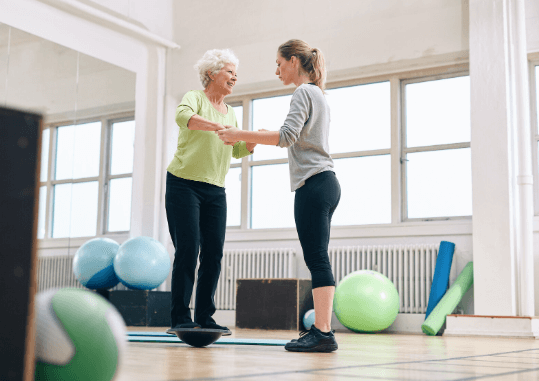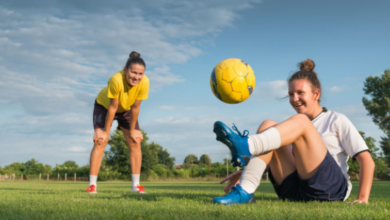The Vital Role of Active Sports in Enhancing Mobility and Flexibility for Senior Citizens

Active sports have benefits for seniors beyond just enjoying the game. Walking football—a senior-friendly form of soccer—can boost mobility and flexibility. This physical health issue affects the elderly’s quality of life, independence, and well-being. This article examines how physical athletics can assist seniors retain and enhance their mobility and flexibility, improving their daily life.
Improve Mobility with Low-Impact Sports
Due to muscular weakness, joint difficulties, and bone density loss, mobility declines with age. However, senior-specific active sports like walking football can help address these difficulties. Walking football, a non-running version of soccer, is appropriate for older persons who have athletic disabilities.
Walking football’s mild jogging and walking improves joint health and muscular strength without the high impact and injury risk of regular soccer. Regular exercise lubricates joints and strengthens surrounding muscles, relieving arthritis and other age-related musculoskeletal disorders. Passing, turning, and shooting develop coordination and flexibility.
Regular exercise improves flexibility
Flexibility decreases with age, causing stiffness and restricted range of motion that can impair daily tasks and increase injury risk. Sports involve stretching and using different muscle groups. For instance, kicking a ball works the legs, hips, and core, improving flexibility and balance.
Activities like walking football help elders maintain flexibility and reduce muscle atrophy. Fall prevention in older individuals depends on regular stretching and vigorous exercise to maintain muscle fiber and connective tissue suppleness. Flexibility improves posture, which is important for balance and reduces back pain and other musculoskeletal issues.
Improved Physical Capacity Maintains Independence
Seniors’ independence depends on mobility. Walking, bending, and standing up from a chair require movement and flexibility. Senior sports assist seniors preserve these skills, allowing them to do daily duties more efficiently and comfortably.
Improved physical health can also boost seniors’ confidence, encouraging them to participate in physical activities and social gatherings they might otherwise avoid owing to fear of falling or injuring. Increased movement improves their mental and physical health and social lives.
Social and Cognitive Benefits of Active Sports
Walking football has cognitive and social benefits, promoting overall wellness. Strategizing, making quick decisions, and remembering plays or situations stimulates the brain, which helps preserve mental clarity as one matures. Through social engagement, team sports can reduce loneliness and isolation in older persons, which can damage physical and mental health.
The team atmosphere promotes emotional support and life happiness by creating a sense of community. Teamwork improves communication, emotional support, and mood, which is good for long-term health.
Fighting Depression and Anxiety
Regular exercise reduces depression and anxiety at all ages, even seniors. Exercise releases endorphins, or ‘feel-good’ hormones, which boost mood. After retirement, seniors may lack structure, but sports can provide it. Goallessness, a major depression trigger, is reduced by this structure.
Moreover, focusing on a sport might temporarily relieve daily tension. When seniors play football, their attention is diverted from their daily concerns to the game. This change gives them a mental break and prevents overpowering sentiments and bad ideas, helping them solve their difficulties.
Improving Self-Confidence
Self-esteem and confidence often deteriorate with age, especially if people have health or mobility concerns. Active athletics help elders achieve goals and improve skills, boosting their self-esteem. Every minor accomplishment, whether it’s improving their game, helping a team win, or just participating more, might change how they see themselves.
Sports also boost seniors’ self-esteem by rewarding them with praise from peers and coaches. Getting praise after a nice play or cheers from teammates and fans can help them feel valued and capable as they age.
Social Interaction and Community
Sports promote socialization, which is important for mental health, especially in older adults who may be alone. Team activities like walking football allow seniors to socialize with like-minded people. Long-term connections and a supportive social network can reduce loneliness and emotional stress.
Socializing through athletics can also help elders feel connected, which is crucial to emotional well-being. After retirement or divorce, working toward a common objective gives people a sense of purpose and integration. Team members often socialize and support one other outside of sports.
Cognitive Fitness and Engagement
Sports can boost elders’ cognitive function and mental agility. Sports challenge and engage the brain with concentration, strategy, and rapid thinking. Cognitive decline and dementia and Alzheimer’s disease can be prevented by regular mental stimulation.
Learning new sports or adapting old talents to new formats (like walking football) can also stimulate the brain. This learning process improves cognitive flexibility and brain growth, which are essential for aging well.
Psyche resilience
Sports assist elders cope with aging by building psychological resilience. Sports’ physical difficulties and competitive nature can help seniors develop a ‘growth mentality’ that sees hurdles as chances for improvement rather than insurmountable obstacles. This resilience can help seniors handle adversity in other areas of life in a healthier, more constructive way.




